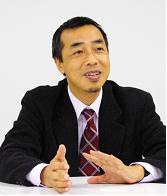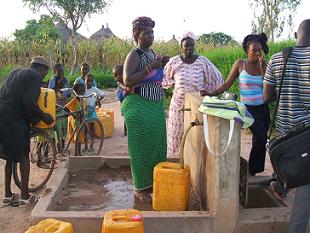Interview【JICA-RI Focus Vol.9】Interview with Senior Research Fellow Atsushi Hanatani
2010.07.13

Atsushi Hanatani, JICA-RI Senior Research Fellow and head of the project“Management of Water User’s Associations and Formation of Collaborative Local Society in Rural Africa,” conducted a three-month field survey in September of 2009. In this interview, he talks about the purpose and significance of this research as well as the contents of the field survey itself.
Why have water issues in Africa taken center stage?
Water issues, which the international community must make efforts to address, are included in the Millennium Development Goals (MDGs) adopted by the United Nations in 2000. It states, “Halve, by 2015, the proportion of the population without sustainable access to safe drinking water and basic sanitation” (Goal 7, Target C). In particular, Sub-Saharan Africa has the poorest supply of safe drinking water in the world. According to the Millennium Development Goals Report 2009, 54% of its overall population still relies on poor sanitary conditions and underdeveloped water sources.
Donors worldwide have been assisting in developing water supply facilities such as hand-pump operated wells by investing up to 25% of the overall aid resources in the water and sanitization sectors. However, according to a survey conducted by the Switzerland-based Rural Water Supply Network, in some countries and regions, 30% to 40% of the water supply facilities have gone unmanaged and neglected, and that the residents have resumed using prior sources of unsanitary water as they had done before. Addressing the causes of such a state will be a first step in providing safe water supply.
How to improve the sustainability of facilities or activities supported by development interventions has always been a challenge. To tackle this, many strategies were attempted such as adjusting facility sizes from larger to smaller, encouraging participatory development, adopting cost sharing principles, and privatization. But as I mentioned previously of the MDG 2009 report, issues in daily necessities in Africa such as water supply systems have not been improved much even till now in terms of sustainable usage, maintenance and management.
Recently, JICA also has been conducting such projects aimed at improving maintenance and management of water facilities – many findings and lessons have already been obtained. However, I feel that these efforts have not analyzed objectively the reasons why and under what conditions people cooperate or not for maintenance and management activities. I think what is important is to put field-based experience into a framework for research, such as is being done at the JICA Research Institute.
“What will enable rural Africans to engage in sustainable management of water facilities?” This is the theme of our research project “Management of Water User’s Associations and Formation of Collaborative Local Society in Rural Africa.” We seek answers to this question through our research and feed the findings to JICA future operations as well as to the international donor community.
Please briefly explain the objectives of your field survey in Africa.
I conducted a three-month field survey from September last year in four villages in Tambacounda, Senegal. The main purposes were, in relation to hand-operated pumps and motorized water supply systems, to understand socio-economic characteristics of the villages and social relationships among the locals, examine the patterns of water usage including alternative sources of water, and study how the management organizations are formed and run, and to what extent the organizational rules are upheld by the villagers.
Apart from the qualitative study, quantitative surveys were also conducted on Senegal as a whole. In the villages where I personally conducted research, I focused on questioning villagers in order to identify social factors that determine their behavior. In the study, we began by understanding how villagers choose a water source depending on particular needs in their daily lives and what value is attached to the water supplied from facilities.
Furthermore, in the interviews, I also focused on social relationships among villagers. In general, we tend to take it for granted that “communities” exist in the villages of Africa where people help each other quite naturally. I wanted to know through my research whether this is really the case, and if so, whether or not such cooperative relationship also applies to maintenance and management of water supply facilities. Here, I came to understand the importance of not only the village’s present, but also of its past. Each village has several decades or even centuries of history. We cannot fully comprehend the circumstances unless we understand the people’s way of thinking and relationships which are a product of their village history.

A community water point, Tambacounda, Senegal
What findings were made in the field survey?
This may seem like common knowledge, but there are cases where “safe water” provided by the government or donor interventions is not always valued by users. If asked, villagers will say, “We need safe water.” But in reality, they use several different water sources depending on their purposes, taking into account economic and social costs and benefits of using a particular kind of water.
Use of safe water incurs costs. All users seek benefits that exceed costs of using the water in different ways depending on each user’s preference. Some people value the cost saving benefits accruing from less exposure to waterborne diseases while others value the labor-saving benefit of not having to transport water from afar. Some women have mentioned social benefits of avoiding having quarrels with other women at the water point, and others remark about their “preference” of water taste or bubbling properties. In this study, we mainly focus on the water supply facilities management problem. Prior to the management problem, there was the issue of whether people would even use the water provided through the facility. That makes a difference in how people engage in management.
Another finding is that, within the community, villagers do not necessarily share rules or communicate within village as much as outsiders would think. Villages in Senegal have official and traditional decision-making organs consisting of village chiefs and elders, but at the same time, there are various subdivisions in the society along such lines as ethnic groups, clans, or carré (a unit consisting of several households sharing a common habitat). Of course there are also interdependent relationships across these lines. But it is also true that there are lines of social divisions (occasionally contentious) in the village in terms of ethnic groups, religious sentiment, marriage restrictions, etc.
When it comes to the question of whether or not to cooperate in managing water supply systems, if you cannot trust others in cooperating, you will feel tempted to “free ride” as would others – such thinking is universal. Therefore, whether or not people can trust others becomes a critical factor for the success of mutual cooperation in water supply system management. However, I came to realize that, in reality such relationships don’t always exist in the “community” in rural Senegal.
How will this study influence JICA operations?
In development interventions aimed at strengthening water users’ associations, we have been focusing on such measures as boosting user participation, building awareness in hygiene and sanitation, providing technical training and strengthening of leadership. In addition to these approaches, based on the results of this study, I think understanding water users’ subjective cognition of the costs and benefits of water use and cooperation in management is also necessary. Doing so will improve the effectiveness of organizational capacity building.
The strength and significance of JICA-RI lies not in doing research for the sake of research, but in its ability to solve various problems in development. This is what drives me to amass research results practical to real-world application through collaboration with JICA operations, now and going forward.

事業事前評価表(地球規模課題対応国際科学技術協力(SATREPS)).国際協力機構 地球環境部 . 防災第一チーム. 1.案件名.国 名: フィリピン共和国.

事業事前評価表(地球規模課題対応国際科学技術協力(SATREPS)).国際協力機構 地球環境部 . 防災第一チーム. 1.案件名.国 名: フィリピン共和国.

事業事前評価表(地球規模課題対応国際科学技術協力(SATREPS)).国際協力機構 地球環境部 . 防災第一チーム. 1.案件名.国 名: フィリピン共和国.

事業事前評価表(地球規模課題対応国際科学技術協力(SATREPS)).国際協力機構 地球環境部 . 防災第一チーム. 1.案件名.国 名: フィリピン共和国.

事業事前評価表(地球規模課題対応国際科学技術協力(SATREPS)).国際協力機構 地球環境部 . 防災第一チーム. 1.案件名.国 名: フィリピン共和国.
scroll